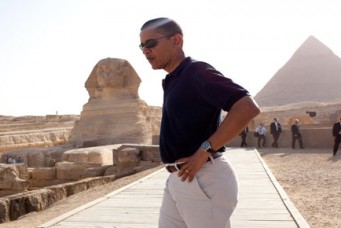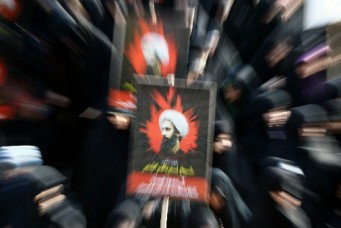Morsi’s Message to America
Even as the goodwill won by Obama’s Cairo University speech has dissipated, the level of engagement pursued early in his term suggested a reevaluation of how America does business in the Middle East. Morsi deserves his own chance to win America’s goodwill, and he’ll have that very opportunity at the UN General Assembly.
Today Egyptian President Muhammed Morsi, the country’s first democratically elected president, arrives in New York for the United Nations General Assembly. He will be coming to a United States that is increasingly wary of the Arab uprisings. Washington was willing to temper its displeasure at Hosni Mubarak’s shortcomings and the interim ruling military council’s faults, but has been much more vocal about Morsi’s equivocations. The recent spat of violence against U.S. embassies has been labeled, “Muslim rage” by Newsweek, overshadowing the people power movements that the Arab Spring were really about.
A cartoon in Shorouk, a daily Egyptian newspaper, neatly sums up the predicament of Egypt’s Muslim Brotherhood at this juncture. It depicts a bearded businessman speaking into a red telephone: “I’m very busy… I need to protest this afternoon and sign contracts with U.S. companies in the evening.” Last week the Brotherhood was even busier, conducting damage control. Tahrir Square, the heart of downtown Cairo and Egypt’s revolution, has been razed and securitized. Workers are frantically planting trees and grass where the families of martyrs had previously set up tents.
Hints from the White House suggest that Washington is craving the consistency of Egypt’s deposed despot. Take, for instance, Mr. Obama’s remark in the midst of the embassy protests—that Egypt is not quite an ally, “but we don’t consider them an enemy.” It’s a surprising criticism given the $1.3 billion earmarked in military assistance to Egypt. Further, it contradicts what U.S. officials have said as recently as August 29.
Visiting Cairo on a high-level business delegation, Robert D. Hormats, the State Department’s Under Secretary for Economic Growth, Energy and the Environment, praised Egypt’s head of state. “President Morsi, through his Renaissance Plan, has indicated his desire to adopt a serious and impressive economic reform agenda,” said Hormats. “The American government wants to be your steadfast partner…”
While the Brotherhood’s Freedom and Justice Party has called for the rebirth and revival of Egypt, it has yet to clearly articulate what that future would look like. For most Egyptians, the oft-touted Renaissance Plan is more of a buzzword than a policy. For Americans, Morsi’s message is simply unknown, a canvas that pundits and politicians use to paint Egypt as anti-Semitic and anti-American, conveniently leaving out the facts.
In June 2009, President Barack Obama had the opportunity to speak to the Egyptian people, over the head of then-President Hosni Mubarak. Even as the goodwill won by Obama’s Cairo University speech has dissipated, the level of engagement pursued early in his term suggested a reevaluation of how America does business in the Middle East. Morsi deserves his own chance to win America’s goodwill, and he’ll have that very opportunity this week at the General Assembly.
How can Morsi tell the world that the still unfolding revolution shares the same democratic values as America and Europe? First, Morsi should state clearly that in the “new” Egypt, the right to protest—against an anti-Islam video, the military, or his own administration—will be respected. On the flipside, violence, by demonstrators or the security apparatus, will not be tolerated. Then, Morsi must convey the obvious: clashes before the U.S. embassy were simply not representative of how Egypt views America. He should emphasize that the Egyptian people love American culture (Sponge Bob is ubiquitous in Cairo storefronts, and McDonalds is as common as falafel).
Next, Morsi should be honest about Egypt’s emerging international posture. His country’s policies are now dictated by public attitudes rather than the top-down influence of Mubarak. Foggy Bottom and the Pentagon will no longer oversee Egypt’s foreign policy. Still, he should promise that Egypt is not only open for business for major multinational corporations but also non-governmental organizations, many of which were scared away by last year’s crackdown.
Unless Morsi can demonstrate to the United Nations, and to the American people, how his country’s renaissance will look, expect his administration to continue to be a punching bag, bumping from crisis to crisis. But Washington must tread equally as carefully. Otherwise Morsi might not be so quick to view Washington as an ally.
Jonathan Guyer is associate editor of the Cairo Review of Global Affairs and a Fulbright fellow researching political cartoons in Egypt. He can be followed on Twitter at @mideastXmidwest.



